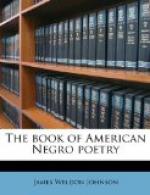Mrs. Harper, Bell and Whitman would stand out if only for the reason that each of them attempted sustained work. Mrs. Harper published her first volume of poems in 1854, but later she published “Moses, a Story of the Nile,” a poem which ran to 52 closely printed pages. Bell in 1864 published a poem of 28 pages in celebration of President Lincoln’s Emancipation Proclamation. In 1870 he published a poem of 32 pages in celebration of the ratification of the Fifteenth Amendment to the Constitution. Whitman published his first volume of poems, a book of 253 pages, in 1877; but in 1884 he published “The Rape of Florida,” an epic poem written in four cantos and done in the Spenserian stanza, and which ran to 97 closely printed pages. The poetry of both Mrs. Harper and of Whitman had a large degree of popularity; one of Mrs. Harper’s books went through more than twenty editions.
Of these four poets, it is Whitman who reveals not only the greatest imagination but also the more skilful workmanship. His lyric power at its best may be judged from the following stanza from the “Rape of Florida”:
“’Come now, my love,
the moon is on the lake;
Upon the waters is my light
canoe;
Come with me, love, and gladsome
oars shall make
A music on the parting wave
for you.
Come o’er the waters
deep and dark and blue;
Come where the lilies in the
marge have sprung,
Come with me, love, for Oh,
my love is true!’
This is the song that on the
lake was sung,
The boatman sang it when his
heart was young.”
Some idea of Whitman’s capacity for dramatic narration may be gained from the following lines taken from “Not a Man, and Yet a Man,” a poem of even greater length than “The Rape of Florida”:
“A flash of steely lightning
from his hand,
Strikes down the groaning
leader of the band;
Divides his startled comrades,
and again
Descending, leaves fair Dora’s
captors slain.
Her, seizing then within a
strong embrace,
Out in the dark he wheels
his flying pace;
He speaks not, but with stalwart
tenderness
Her swelling bosom firm to
his doth press;
Springs like a stag that flees
the eager hound,
And like a whirlwind rustles
o’er the ground.
Her locks swim in dishevelled
wildness o’er
His shoulders, streaming to
his waist and more;
While on and on, strong as
a rolling flood,
His sweeping footsteps part
the silent wood.”




